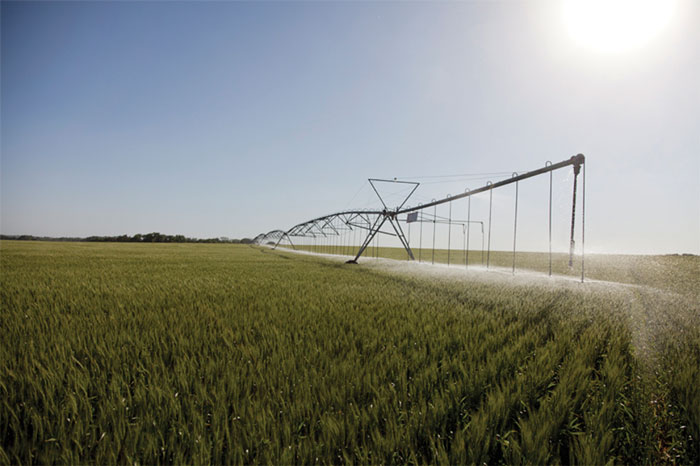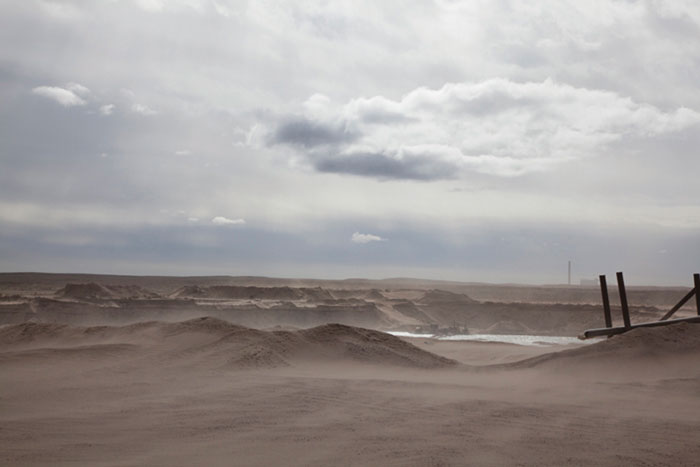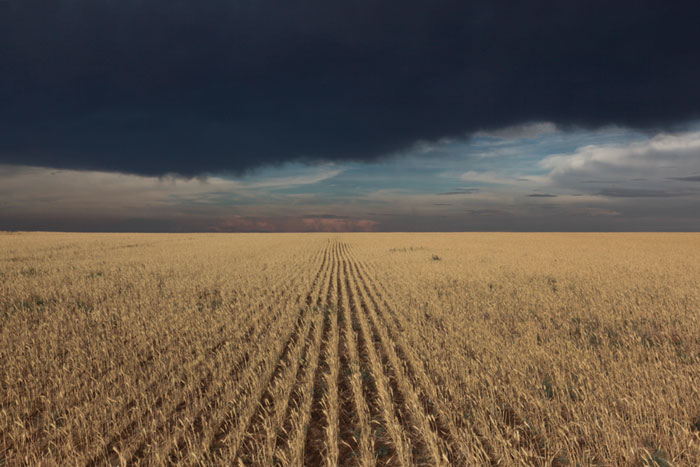| 2014 Q2 | story by JOE MONACO | photos by LARRY SCHWARM |

Circle irrigation system, Reno KS
The future of agriculture in Kansas could be daunting as global climate change and resource depletion stemming from industrial farming take hold over coming decades.
Now, researchers for the interdisciplinary, National Science Foundation-funded Biofuels and Climate Change: Farmers’ Land Use Decisions group at the University of Kansas, led by Dietrich Earnhart, a professor of economics, are looking at what drives decision-making by Kansas farmers confronted with these tougher conditions. Through an unprecedented survey and interviews with hundreds of Kansas farmers, the researchers wanted to know if harsher prospects for agriculture in the future affect how farmers make decisions today.
Benjamin Gray, a doctoral student in anthropology, has been involved in collecting and analyzing the interviews.
“Sustainability can be a tricky concept to define,” said Gray. “If something is sustainable, does that mean that it can be done the same way 10 years from now, 50 years from now or in perpetuity? Many of the farmers we interviewed consider themselves to be practicing sustainable agriculture. And they are absolutely correct in some senses. They have been farming the same ground for decades and have every expectation of being able to farm the same way tomorrow.”
But Gray cited KU research conducted in 2008 by Nate Brunsell and Johannes Feddema suggesting that Kansas farmers in coming years could face hotter weather, stronger storms and higher rates of evaporation from the soil and transpiration by crops. Moreover, on the Kansas High Plains, farmers today are drawing water from the Ogallala Aquifer faster than it can be recharged — causing the water table to plummet.

Sandstorm south of Holcomb, Ks, with Sunflower Electric Plant in the distance
Other practices today also could make farming more precarious in the coming years. “The herbicides and pesticides used in industrial agriculture can lead to problems such as reduced biological diversity of soil life, soil acidification and reduction of soil organic carbon — all of which undermine fertility and so necessitate additional chemical inputs,” said Gray.
Part of the Climate and Energy track of Kansas EPSCoR, funded by the National Science Foundation, the interdisciplinary BACC:FLUD team investigates farmers’ decision making under conditions of climate change and expansion of the biofuel industry in the state of Kansas.
Along with the extensive surveys and interviews to identify the factors behind farmers’ decisions, BACC:FLUD researchers at the Kansas Applied Remote Sensing Program used satellite remote sensing to develop a database of how land is actually used across Kansas.
As an anthropologist, Gray relies on “Actor-Network Theory” to help understand why farmers use practices that are industrial or sustainable in nature.
“Actor-Network Theory is a method of analysis that considers how environmental, social and technical factors both enable and constrain decision making,” he said. “It asks questions about the ways that people initiate and sustain action. It is a useful approach for asking questions in situations where there are numerous, and sometimes disparate, groups involved in a complex enterprise, as is often the case in industrial societies.”

Wheatstorm
With Jane Gibson, associate professor of anthropology, who leads the interviews group, Gray recently published findings based on Actor-Network Theory in the peer-reviewed journal Culture, Agriculture, Food and Environment. They found that the industrial agricultural network “entrenches unsustainable production practices making it difficult for farmers to do things in other ways.”
“Industrial agriculture is called such because it uses the products of industry in its own production process,” Gray said. “Animal and human labor are replaced with machinery and chemicals. This definition has nothing to do with scale but instead refers to the manner of farming. So in a general sense, I think that industrial agriculture can continue as long as the fossil fuel, fertilizers and pesticides on which it depends are available and effective.”
“However, farmers are already dealing with herbicide-resistant weeds, and there have been reports in Kansas of corn rootworms that have become resistant to Bt endotoxin-producing corn, a type of GMO corn that produces its own pesticide,” he said. “In some cases, the technologies we use to address agricultural problems have created new problems. This can lead to a tricky treadmill where innovation may eventually fail to keep pace with emerging problems.”
Gray said he and Gibson found that farmers take seriously their roles as responsible guardians of the environment, but they can be ill-served in this mission by the networks and techniques tied to modern industrial agriculture on which they depend for their livelihoods.
“Our research showed us that farmers care very much about being good stewards of their land and resources,” he said. “The specter of the Dust Bowl looms large in their collective memories, and they are vigilant about controlling soil erosion from the wind and rain. However, economic imperatives and the technological transformation of production sometimes constrain their practices in ways antithetical to long-term agro- ecosystem health.”

2 Comments
Great blog.Really thank you! Awesome.
Hi there, I found your website by the use of Google while searching for a related subject, your web site
came up, it looks great. I have bookmarked it in my google bookmarks.
Hello there, simply was alert to your weblog thru Google, and located that it’s truly informative.
I’m going to watch out for brussels. I’ll appreciate should you proceed
this in future. Numerous other folks can be benefited from your writing.
Cheers!